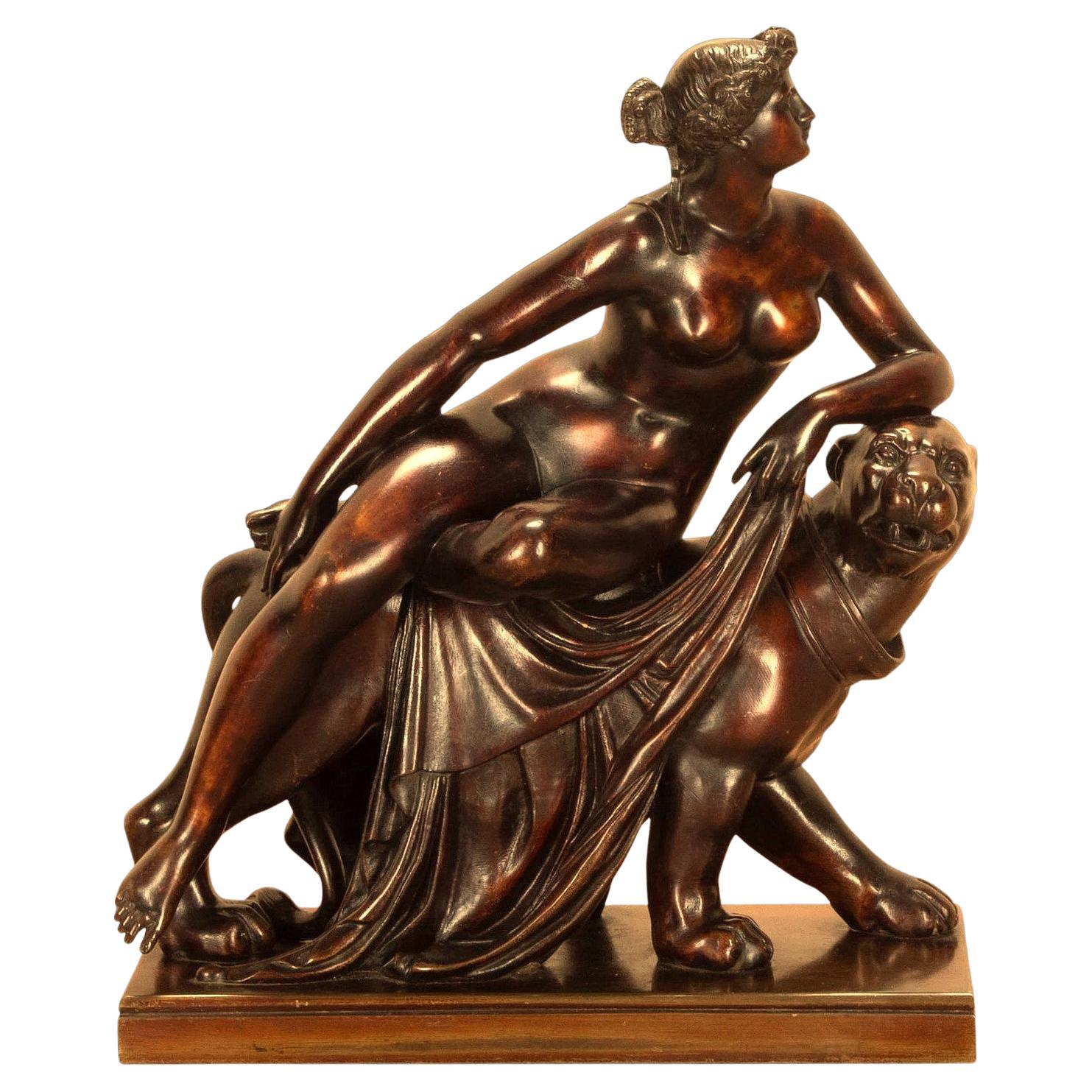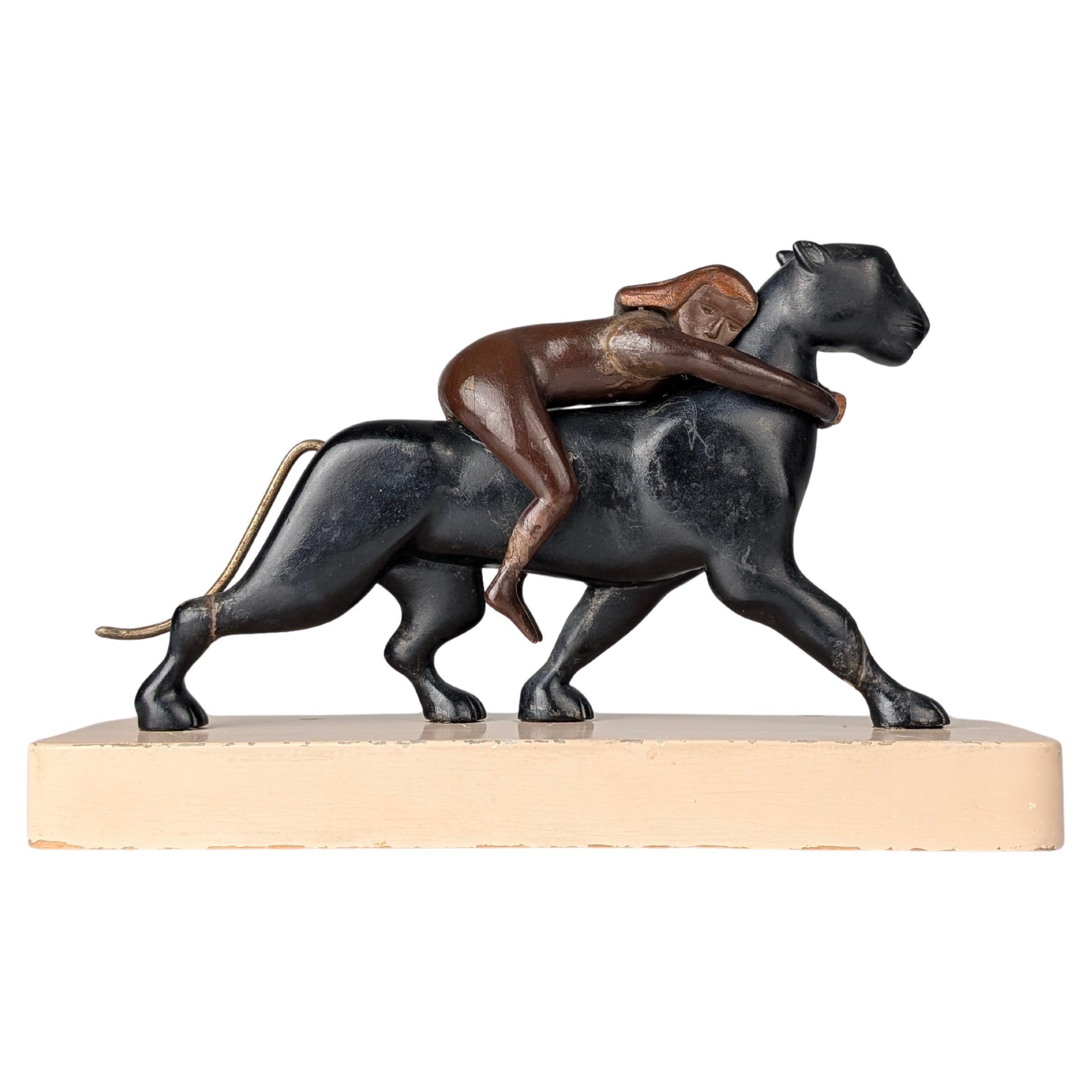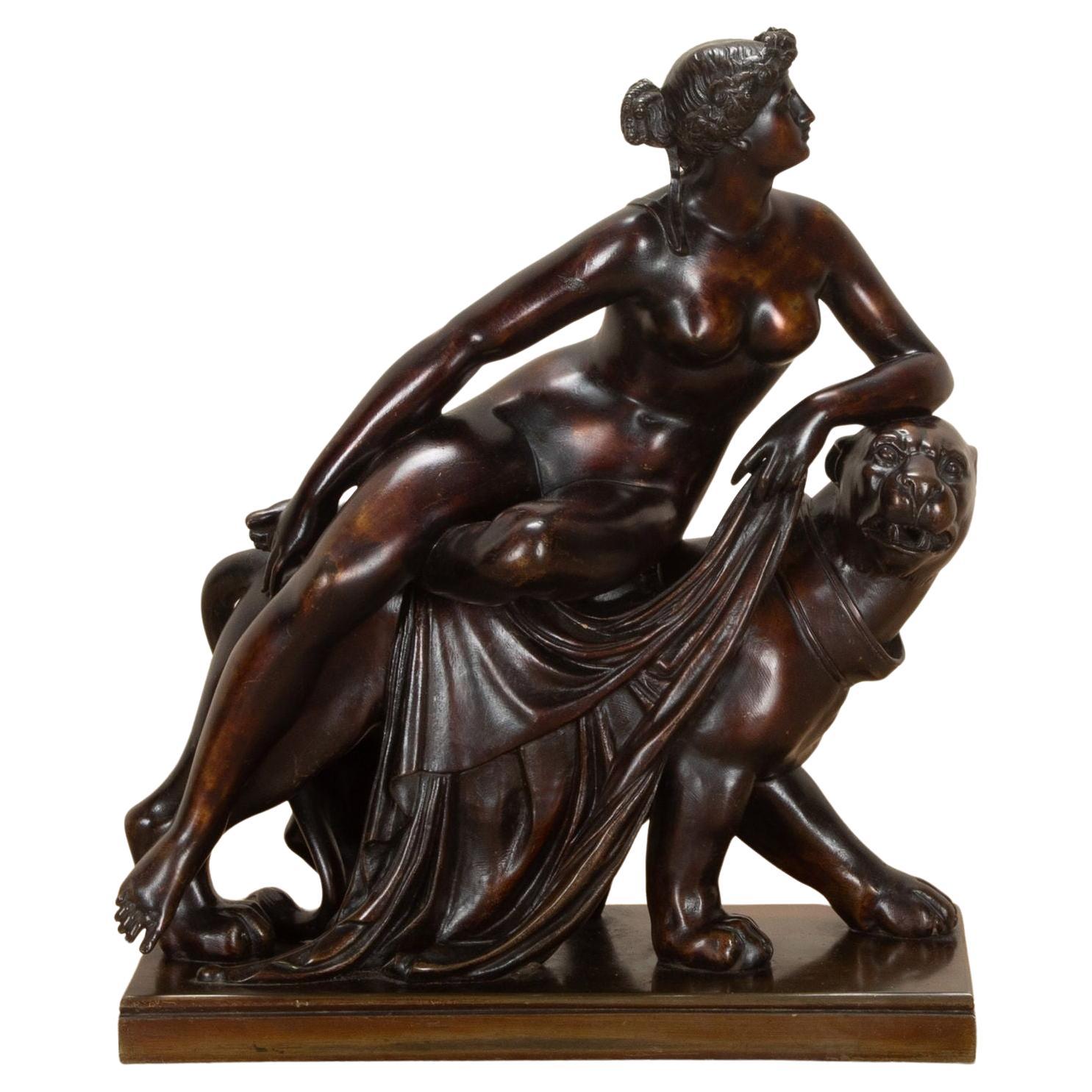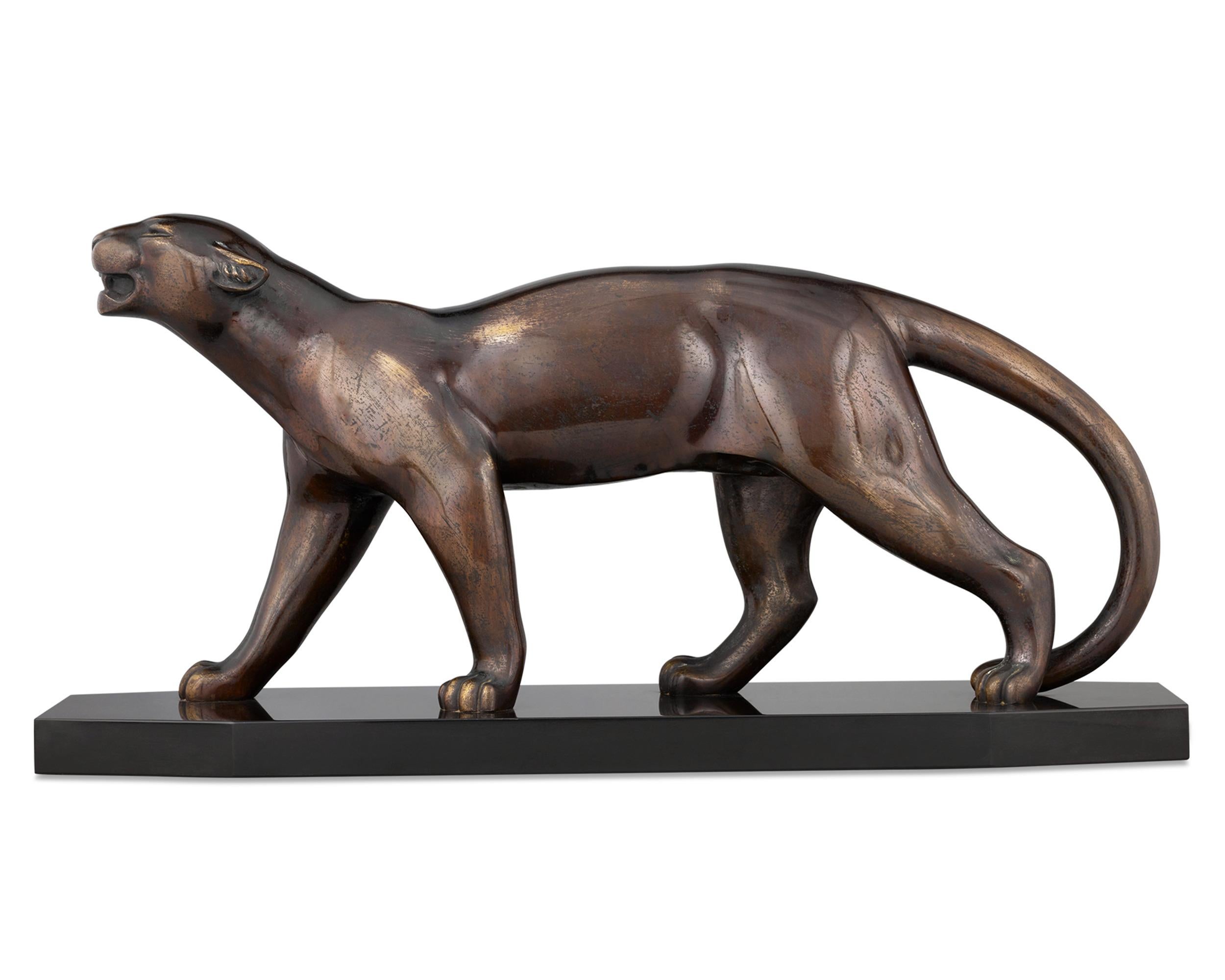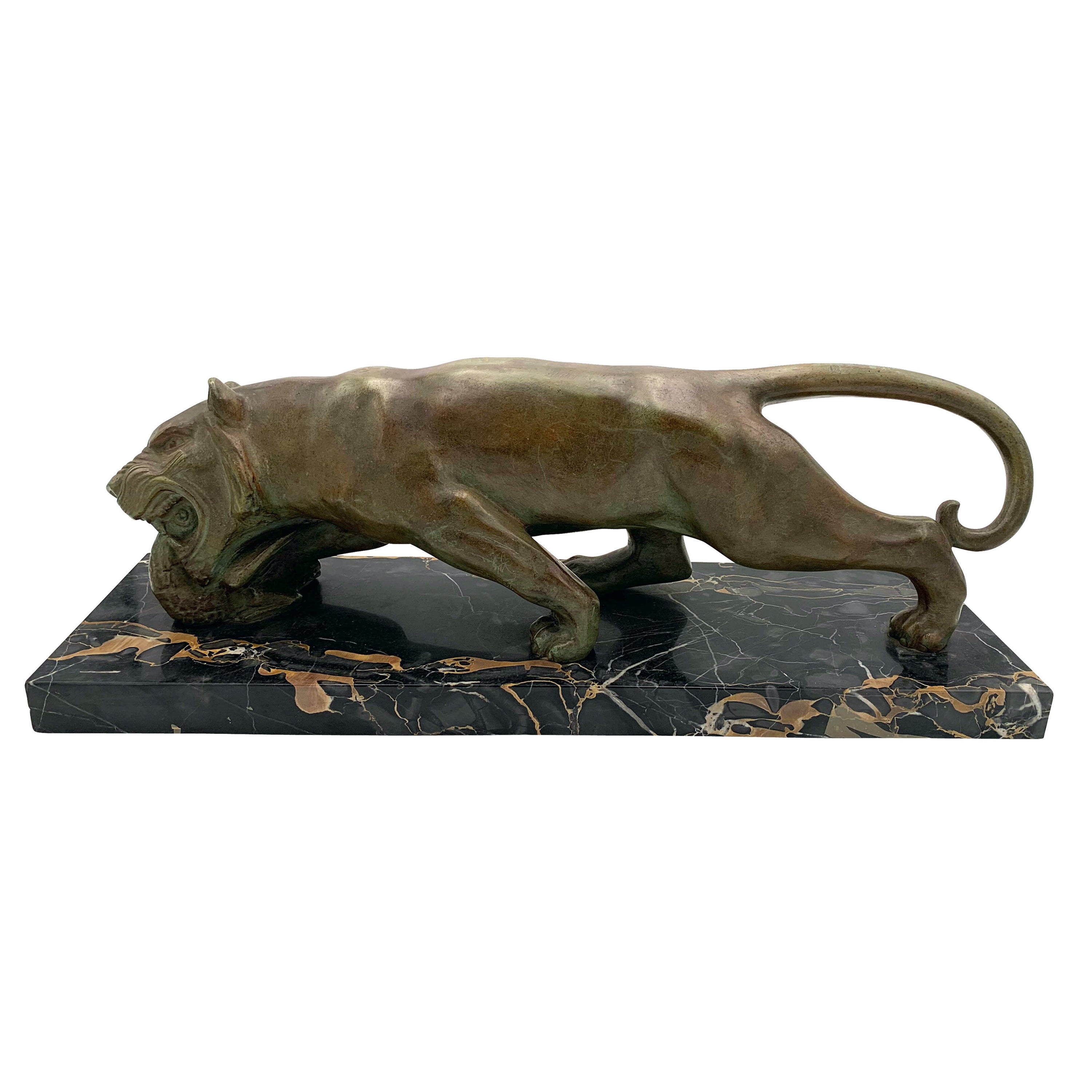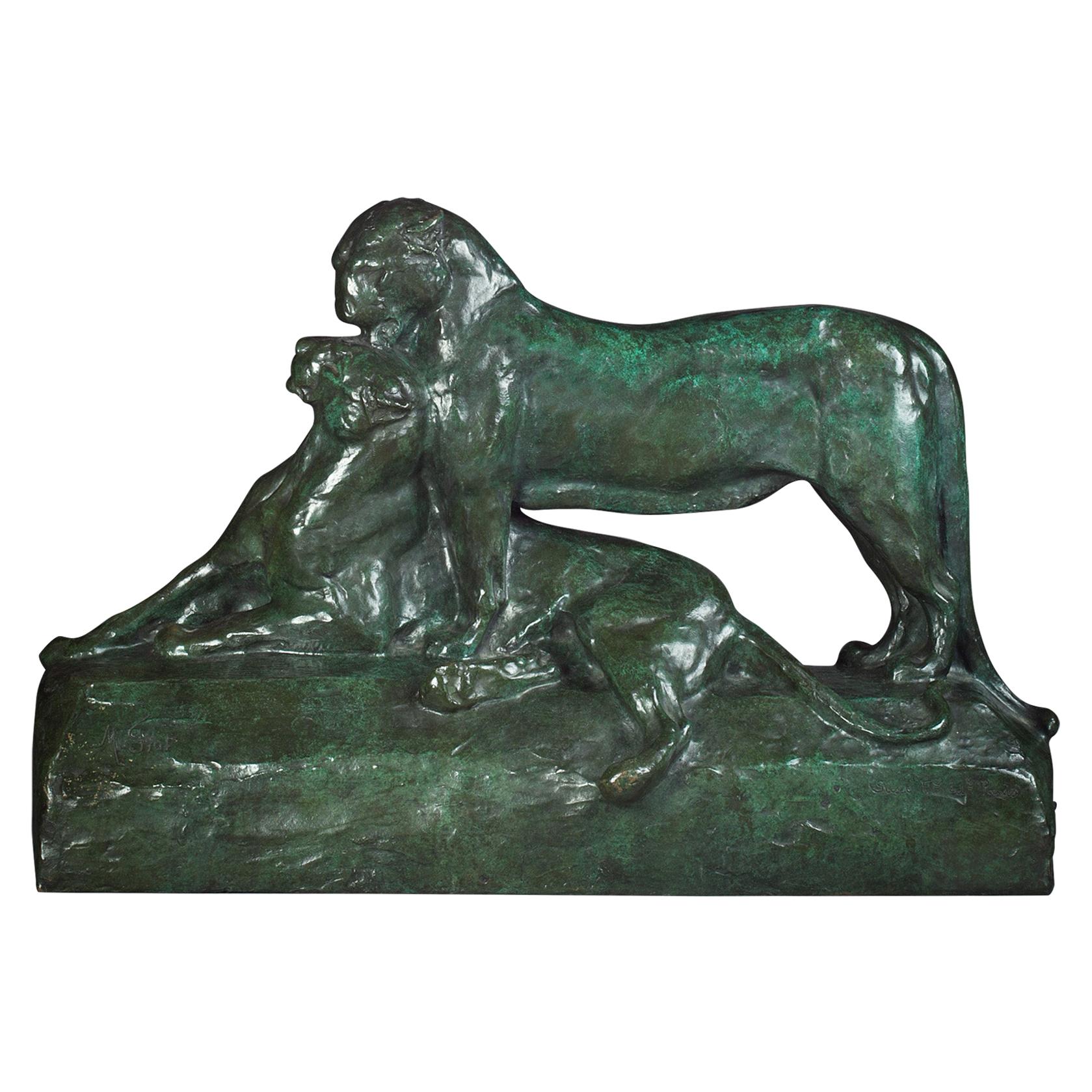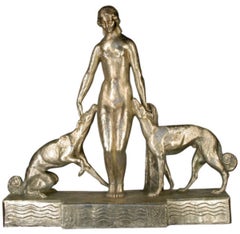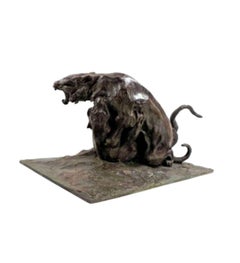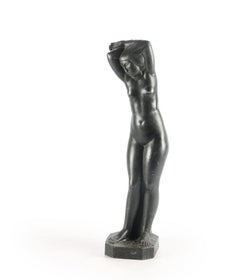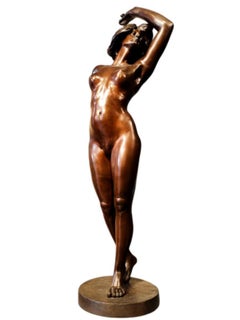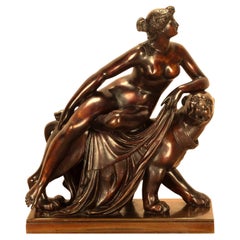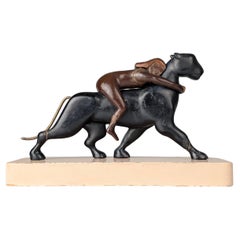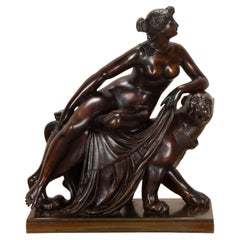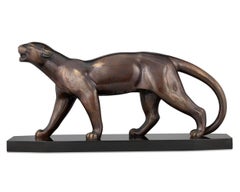Items Similar to Woman and Panther - Bronze by Albert Poncin (1877-1954), Art Deco influence
Want more images or videos?
Request additional images or videos from the seller
1 of 10
Albert Poncin Woman and Panther - Bronze by Albert Poncin (1877-1954), Art Deco influence20th century
20th century
$12,578.13
£9,424.94
€10,650
CA$17,661.08
A$19,356
CHF 10,108.07
MX$232,249.71
NOK 126,924.12
SEK 119,557.82
DKK 81,118.87
About the Item
Albert Poncin’s Femme à la Panthère is a striking and elegant Art Deco bronze sculpture that perfectly encapsulates the movement’s characteristic blend of stylized modernity and classical sensuality. This piece, crafted in patinated bronze, depicts a nude woman walking in tandem with a powerful panther. The composition is fluid, capturing a moment of poised motion between the human figure and the feline, an artistic metaphor for the harmony between nature and human elegance.
The sculpture's form is defined by elongated, streamlined lines that emphasize grace and dynamism. The woman’s body is both athletic and refined, her posture exuding effortless control, with one hand resting on her hip while the other gently caresses the panther’s head. The panther, in contrast, embodies restrained power, its muscular form taut yet relaxed, as if responding to the woman's unspoken command. The contrast between the woman’s smooth, polished skin and the slightly textured treatment of the panther’s fur enhances the play of light across the sculpture, a hallmark of high-quality bronze craftsmanship.
Poncin’s work is steeped in influences from both the classical tradition and the Art Deco aesthetic. The woman's hairstyle, a sleek bob with geometric precision, recalls the fashion of the 1920s and 1930s, a period when Art Deco was at its height. The influence of renowned sculptors such as Demétre Chiparus and Paul Manship can be seen in the stylized realism of the female figure, while the theme of a woman accompanied by a panther is reminiscent of Rembrandt Bugatti’s celebrated animalier bronzes.
The sculpture’s base is subtly oval, providing stability while reinforcing the organic, naturalistic movement of the figures. The oval foundation prevents a static, rigid feel, allowing the figures to appear as though they are moving forward with effortless grace. The green and black patina of the bronze is particularly well-applied, providing depth and a sense of richness to the figures.
Poncin’s Femme à la Panthère is more than a decorative Art Deco piece—it is a study in the balance of strength and sensuality, movement and stillness, humanity and the untamed spirit of the animal world. It stands as a testament to the sculptor’s mastery of form and material, embodying the luxury and sophistication of the Art Deco era.
- Creator:Albert Poncin (1877 - 1954)
- Creation Year:20th century
- Dimensions:Height: 19.3 in (49 cm)Width: 6.7 in (17 cm)Depth: 18.12 in (46 cm)
- Medium:
- Movement & Style:
- Period:
- Condition:
- Gallery Location:Gent, BE
- Reference Number:1stDibs: LU2140216033182
About the Seller
5.0
Vetted Professional Seller
Every seller passes strict standards for authenticity and reliability
Established in 2018
1stDibs seller since 2022
6 sales on 1stDibs
Typical response time: 2 hours
- ShippingRetrieving quote...Shipping from: Gent, Belgium
- Return Policy
Authenticity Guarantee
In the unlikely event there’s an issue with an item’s authenticity, contact us within 1 year for a full refund. DetailsMoney-Back Guarantee
If your item is not as described, is damaged in transit, or does not arrive, contact us within 7 days for a full refund. Details24-Hour Cancellation
You have a 24-hour grace period in which to reconsider your purchase, with no questions asked.Vetted Professional Sellers
Our world-class sellers must adhere to strict standards for service and quality, maintaining the integrity of our listings.Price-Match Guarantee
If you find that a seller listed the same item for a lower price elsewhere, we’ll match it.Trusted Global Delivery
Our best-in-class carrier network provides specialized shipping options worldwide, including custom delivery.More From This Seller
View AllDiana and the Hounds, a bronze sculpture by Giuseppe Joseph D’Aste (1881–1945)
Located in Gent, VOV
Diana and the Hounds by Giuseppe Joseph D’Aste is a finely executed silvered bronze sculpture from the 1920s, cast using the lost-wax (cire perdue) metho...
Category
Early 20th Century Nude Sculptures
Materials
Bronze
Guido Righetti - (1875-1958), Bronze+ Fighting Tigers n°1
Located in Gent, VOV
Fighting Tigers No1
This statue by Guido Rigehtti (1875-1958) represents two tigers in a violent combat. It was originally created in 1919. In total Righetti created three different...
Category
Early 20th Century Modern Figurative Sculptures
Materials
Bronze
Jeune Femme Debout, les Bras sur la Tête – Bronze by Henri Parayre (1879-1970)
Located in Gent, VOV
Henri Ernest Parayre’s Jeune femme debout les bras sur la tête is a striking embodiment of early 20th-century French sculpture, seamlessly blending classical inspiration with the eme...
Category
Early 20th Century Nude Sculptures
Materials
Bronze
Georges Flamand Bronze Danseuse (c. 1900–1910)
Located in Gent, VOV
This elegant and finely balanced bronze sculpture by Georges Flamand (1866 – ca. 1931) represents a Danseuse—a female dancer poised in a moment of lyrical movement, one arm arching g...
Category
20th Century Art Deco Nude Sculptures
Materials
Bronze
Antoine - Louis BARYE (1795-1875)Tiger surprising an antelope Bronze
By Antoine-Louis Barye
Located in Gent, VOV
Tiger surprising an antelope (terrace without profile)
Bronze with a shaded green patina, circa 1880
Signed 'BARYE', stamped 'H' by the founder Brame
Antoine-Louis Barye (1796-187...
Category
19th Century Figurative Sculptures
Materials
Bronze
Georges Gardet — (1863-1939)+ Bronze cast, Lion Devouring an Antelope
By Georges Gardet
Located in Gent, VOV
Lion Devouring an Antelope
A fine bronze cast of a lion, representing the carnivore who has just killed an antelope, by Georges Gardet (1863-1939). An old cast with a dark brown sha...
Category
Late 19th Century Realist Figurative Sculptures
Materials
Bronze
You May Also Like
19th Century Bronze Group ‘Ariadne and the Panther’
Located in Shipston-On-Stour, GB
A good sized 19th Century Classical Grand Tour Bronze group of Ariadne And The Panther, modelled with Ariadne reclining to the left while her head is looking to the same side, with h...
Category
Antique 1830s German Neoclassical Figurative Sculptures
Materials
Bronze
Ariadne and the Panther, Art Deco Sculpture in Wood and Brass, 1920s
Located in Benalmadena, ES
This captivating Art Deco sculpture, created around 1920, is inspired by the depiction of Ariadne, the heroine of Greek mythology, atop a majestic panther in motion. Crafted from car...
Category
Vintage 1920s European Art Deco Animal Sculptures
Materials
Brass
$2,834 Sale Price
20% Off
19th Century Bronze Group ‘Ariadne and the Panther’
Located in Gloucestershire, GB
A good sized 19th Century Classical Grand Tour bronze group of Ariadne and the. Modelled with Ariadne reclining to the left while her head is looking to the same side, with her robe ...
Category
Antique Early 19th Century German Grand Tour Figurative Sculptures
Materials
Bronze
Panther by Émile Louis Bracquemond
Located in New Orleans, LA
Émile Louis Bracquemond
1889-1970 French
Panther
Bronze
This exquisite bronze sculpture of a panther was created by French sculptor Émile Louis Bracquemond. The artist was clearl...
Category
20th Century Art Deco Figurative Sculptures
Materials
Bronze
Price Upon Request
Art Deco Panther Sculpture, Solid Bronze, Signed, France circa 1930
By Emile Gregoire 1
Located in Regensburg, DE
Signed high-quality heavy Art Deco Bronze Sculpture of an eating Big Cat, Panther or Lioness from France about 1930.
Signed: "Grégoire" (on side of the leg).
Material: Solid Bronze, ...
Category
Vintage 1930s French Art Deco Animal Sculptures
Materials
Marble, Bronze
Bronze Sculpture of Two Panthers, by Maximillien Louis Fiot
Located in New York, NY
Signed 'M. Fiot' and with foundry mark 'Susse Fres Edts Paris Cire Perdue'.
Category
Vintage 1910s Animal Sculptures
Materials
Bronze
More Ways To Browse
Art Deco Woman
Art Deco Bronze Sculpture Nude
Panther Art
Art Deco Female Bronze Sculptures
Art Deco Woman Sculpture
Art Deco Panther
Bronze Nude Woman
Panther Bronze
Art Deco Panther Sculpture
Bronze Panther Sculpture
Animalier Sculpture Bronze
Art Deco Bronze Panther
Rembrandt Bugatti
Bugatti Sculpture
Bugatti Bronze
William Debilzan
William Morris Glass Art
Winged Hat Hermes
